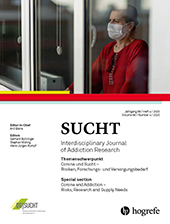Empfehlung zu Glücksspielwerbung während der Corona-Pandemie
Abstract
Zusammenfassung.Theoretischer Hintergrund: Glücksspielwerbung steht in einem natürlichen Spannungsverhältnis zu besonders wichtigen Zielen der Suchtprävention sowie einer effektiven Abwehr von Suchtgefahren. Entsprechend besteht die grundsätzliche Notwendigkeit, Werbung für Glücksspiele aus Gründen des Jugend- und Spielerschutzes auf ein absolutes Minimum zu begrenzen. Aktuelle Situation: Die diversen Schutzbestimmungen im Zusammenhang mit COVID-19 dürften in Verbindung mit Prozessen der sozialen Isolation bei einem signifikanten Anteil der Bevölkerung zu deutlichen psychosozialen und finanziellen Belastungen führen. Mögliche Folgen: In der Konsequenz liegt die Vermutung nahe, dass das Glücksspielverhalten verstärkt internetgestützt aus den eigenen vier Wänden heraus erfolgt. Vor diesem Hintergrund ist die hierzulande aktuell zunehmend zu beobachtende Werbung für Online-Casinoanbieter aus suchtfachlicher Sicht scharf zu kritisieren. Diese Entwicklung steht im Widerspruch zu den Bemühungen anderer europäischer Ländern, die von einem temporären Komplettverbot von Glücksspielen bis zu erheblichen Werberestriktionen reichen. Schlussfolgerungen: Infolgedessen wird die Forderung abgeleitet, während der Corona-Krise jegliche Form der Werbung für Online-Glücksspiele auszusetzen und perspektivisch die grundsätzlich liberale Haltung zur Glücksspielwerbung im Rahmen des Glücksspielstaatsvertrages zu überdenken.
Abstract.Theoretical background: Gambling advertising appears to be inherently conflicting with the particularly important goals of addiction prevention and effective protection against the dangers of addiction. Accordingly, there is a fundamental necessity to limit advertising for gambling products to an absolute minimum for reasons of youth and gambler protection. Current situation: The various protective provisions in connection with COVID-19, in conjunction with processes of social isolation, are likely to lead to significant psychosocial and financial burdens for a significant proportion of the population. Possible consequences: Therefore, it seems plausible that gambling participation via the Internet at home is becoming more popular. Against this background, the increasing advertising for online casino providers that can currently be observed in Germany must be strongly criticized from an experts’ perspective. This development contradicts the efforts of other European countries, which range from a temporary complete ban on gambling to considerable advertising restrictions. Conclusions: As a result, we demand to suspend all forms of advertising for online gambling during the Corona crisis and, in perspective, to reconsider the fundamentally liberal attitude to gambling advertising under the State Treaty on Gambling.
Literatur
(2020). Gambling before and during the COVID-19 pandemic among European regular sports bettors: An empirical study using behavioral tracking data. International Journal of Mental Health and Addiction. https://doi.org/10.1007/s11469-020-00327-8
BGC members to remove TV and radio gaming advertising during COVID-19 lockdown (2020). Verfügbar unter https://bettingandgamingcouncil.com/news/gaming-advertising-removed.(2019, November). A bibliography of empirical studies on gambling advertising (3rd ed.). Gothenburg, Sweden. Verfügbar unter https://ongambling.org/bibliography-gambling-advertising.pdf.
(2020a). Changes in online gambling during the COVID-19 pandemic. Statistical Bulletin no. 25. Canberra: Australian Institute of Criminology. Verfügbar unter: http://www.aic.gov.au/publications/sb/sb25
(2020b). Changes in online gambling during the COVID-19 pandemic: April update. Statistical Bulletin no. 27. Canberra: Australian Institute of Criminology. Verfügbar unter http://www.aic.gov.au/publications/sb/sb27.
(2020a). Ausgangssperre in Spanien: Regierung verbietet Werbung fürs Online-Glücksspiel. Verfügbar unter
https://www.casinoonline.de/nachrichten/spanien-regierung-verbietet- werbung-fuers-online-gluecksspiel-36757 .(2020b). Finnland schränkt Online-Glücksspiel während der Corona-Pandemie ein. Verfügbar unter https://www.casinoonline.de/nachrichten/finnland-begrenzt-online-gluecksspiel- waehrend-der-corona-pandemie-38272.
(2017). Exposure to gambling advertisements and gambling behavior in young people. Journal of Gambling Studies, 33, 1–13.
(2010). An empirical study examining the impact of gambling advertisements on adolescent gambling attitudes and behaviors. International Journal of Mental Health and Addiction, 8, 21-34.
Drogenbeauftragte will Eindämmung von Werbung für Online-Glücksspiel (2020). Verfügbar unter https://www.aerzteblatt.de/nachrichten/112241/Drogenbeauftragte-will-Eindaemmung- von-Werbung-fuer-Online-Gluecksspiel.(2020). Fragwürdige Werbung für Online-Glücksspiele. Verfügbar unter https://www.ndr.de/nachrichten/info/Online-Casinos-und-Corona-Fragwuerdige-Gluecksspiel-Werbung,gluecksspiel326.html.
(2019). Problem gambling in Greece: Prevalence and risk factors during the financial crisis. Journal of Gambling Studies, 35, 1193–1210.
Fachbeirat Glücksspielsucht (2020). Stellungnahme zum Staatsvertrag zur Neuregulierung des Glücksspielwesens in Deutschland: Entwurf nach der Sonder-CdSK am 17./18. Januar 2020. Verfügbar unter https://www.dg-sucht.de/fileadmin/user_upload/pdf/stellungnahmen/200205_Gl%C3 %BCNeuStV_Stellungnahme_und_Positionspapier_Fachbeirat.pdf.(2020). Changes in gambling behavior during the COVID-19 pandemic – A web survey study in Sweden. International Journal of Environmental Research and Public Health, 17, 4014. https://doi.org/10.3390/ijerph17114013
(2020). Gambling during the COVID-19 crisis – A cause for concern? Journal of Addiction Medicine. doi: 10.1097/ADM.0000000000000690
(2015). The impact of gambling advertising: Problem gamblers report stronger impacts on involvement, knowledge, and awareness than recreational gamblers. Psychology of Addictive Behaviors, 29, 483–491.
(2018). Werbung und Sportwetten – Eine kritische Auseinandersetzung aus suchtfachlicher Sicht. Wissenschaftliche Expertise im Auftrag des Arbeitskreises gegen Spielsucht Unna e. V.
(2005). Pathologisches Spielverhalten bei Glücksspielen im Internet. Wiener Zeitschrift für Suchtforschung, 28(1–2), 29–41.
(2019). Das Gefährdungspotenzial von Online-Glücksspielen: Eine systematische Literaturanalyse. Forschungsbericht: Universität Bremen.
(2018). Do simulated gambling activities predict gambling with real money during adolescence? Empirical findings from a longitudinal study. Journal of Gambling Studies, 34, 929–947.
(2014). Sports betting and advertising (AGRC discussion paper No. 4). Melbourne: Australian Gambling Research Centre.
(2019). The role of emotion regulation in video gaming and gambling disorder: A systematic review. The Canadian Journal of Addiction, 10(4), 19–29.
(2020). Prävention der Glücksspielsucht: Warum Maßnahmen des Spielerschutzes von Glücksspielanbietern kaum Wirkung zeigen. SUCHT, 66, 45–56.
(2020). Gambling marketing from 2014 to 2018: A literature review. Current Addiction Reports, 6, 49–56.
(2017). Economic recession affects gambling participation but not problematic gambling: Results from a population-based follow-up study. Frontiers in Psychology, 8, 1247.
(2020). Profit mit der Sucht? Online-Casinos schalten mehr Werbung. Verfügbar unter https://www.computerbild.de/artikel/cb-News-Freizeit-Profit-auf-Kosten-von-Suchtkranken-Online-Casinos-schalten-mehr-Werbung-25663905.html.
(2014). Associations between national gambling policies and disordered gambling prevalence rates within Europe. International Journal of Law and Psychiatry, 37, 217–229.
(2020). Online Gambling Banned in Latvia due to Covid-19. Verfügbar unter https://www.gamblingnews.com/news/the- latvian-government-issued-an-updated-bill-this-monday-effectively-banning-online-gambling.
Responsible Gambling Council (2020). The emerging impact of COVID-19 on gambling in Ontario. Verfügbar unter https://www.responsiblegambling.org/wp-content/uploads/RGC-COVID-and-Online-Gambling-Report_June8.pdf.(2020). Covid-19: We must take urgent action to avoid an increase in problem gambling and gambling related harms. Verfügbar unter https://blogs.bmj.com/bmj/2020/04/06/covid-19-we- must-take-urgent-action-to-avoid-an-increase-in-problem-gambling-and-gambling-related-harms.
(2020). Belgium imposes weekly €500 online gambling deposit limits. Verfügbar unter https://calvinayre.com/2020/04/07/business/belgium-weekly-online-gambling- deposit-limits.



